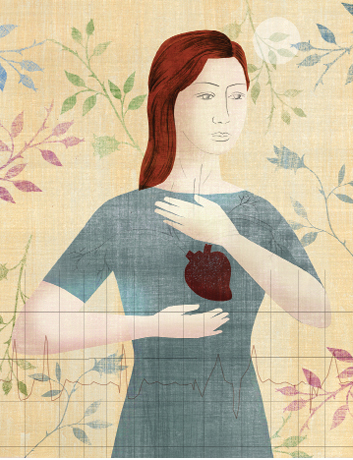
Fighting cancer is tough enough without adding heart disease to the equation. The Vanderbilt Cardio-Oncology program has fostered a collaborative relationship combining the expertise of cardiologists and oncologists to understand effects of cancer therapy on the heart. This type of collaboration is helping to define the cardiovascular health of more than 14 million cancer survivors in the United States.
“A dramatic increase of effective new cancer treatments has given us an enlarging group of cancer survivors,” says Dr. Michael Neuss, professor of clinical medicine and chief medical officer of the Vanderbilt–Ingram Cancer Center. “Survivorship care is designed to address both the short- and long-term effects of these treatments. At Vanderbilt we are fortunate to have national leaders in this new area, including specific programs addressing the cardiac and neurologic consequences of cancer.”
The incidence of heart disease has increased in cancer survivors in part as a direct result of cancer therapy itself. This is especially true for breast cancer.
“Heart failure can be caused by breast-cancer therapy, especially anthracyclines or trastuzumab. We have also begun to appreciate radiation therapy for breast cancer as a significant risk factor for heart attacks in breast-cancer survivors,” says Dr. Javid Moslehi, assistant professor of medicine, who recently joined Vanderbilt Heart and Vascular Institute (VHVI) as director of cardio-oncology.
Moslehi, who came to Vanderbilt from Harvard Medical School, is collaborating with oncologist Dr. Debra Friedman, surgical urologist Dr. David Penson, interventional cardiologist Dr. David Slosky, and heart failure specialist Dr. Daniel Lenihan to implement guidelines to prevent cardiovascular disease in cancer survivors.
At the heart of the guidelines is a simple concept Moslehi calls the ABCDE of cardiovascular disease prevention in cancer survivors:
• Awareness and prophylactic aspirin;
• Blood-pressure control;
• Cholesterol lowering, cessation of cigarette smoking;
• Diet; dose of chemotherapy; diabetes management; and
• Exercise.
Cardiovascular health of cancer survivors will be a new focus of the National Comprehensive Cancer Network (NCCN), an alliance of 25 U.S. cancer centers. Moslehi and Friedman represent Vanderbilt in the NCCN’s clinical practice guidelines in oncology survivorship.